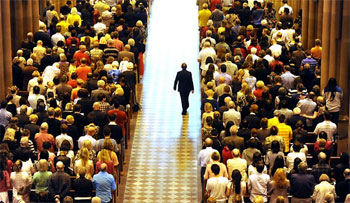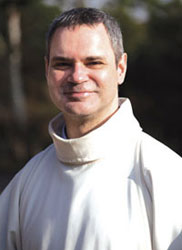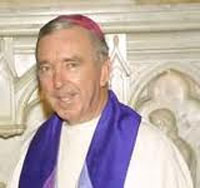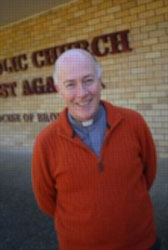
He told the faithful in St Peter’s Square that Christians were called to live this period before Christmas without being distracted by commercial messages and by the festive lights even if low key as a result of the economic crisis.
Instead, he continued, they should look to Christ the “true light of the world”.
In this season, he said “ we should live waiting for Jesus, and not stop waiting for his coming.”
As is tradition on this particular Sunday of Advent, thousands of children with their parents gathered in St Peter’s Square for the traditional blessing of the “bambinelli” or little baby Jesus’ statuettes that are put in the crib.
To the children the Holy Father had a special message. “Dear children,” he said, “when you pray in front of your Nativity scene, remember me as well, as I remember you. Thank you and Merry Christmas!”
Reflecting on this Sunday’s liturgy called “Gaudete” the Pope said, it was an invitation to a joyful and not a sad watchfulness.
The essence of true joy underlined the Pope is not having fun in order to divert ourselves from our responsibilities, which at times is important, but it is something much more, it is our ability to have a true relationship with God.
Finally, before his greetings in a number of languages the Pope recalled the anniversary of the Universal Declaration of Human Rights, and stressed that the first right is the right to life.
He also welcomed the representatives of the Movement for Life, who are in Rome for the ‘Mother of Teresa prize’, which is awarded in memory of Chiara Lubich, founder of the ‘Focolari’ Movement.
INTERNATIONAL : RIP CARDINAL JOHN FOLEY OF PHILADELPHIA AGE 76

MYFOXPHILLY REPORT: Cardinal John Patrick Foley, Grand Master Emeritus of the Equestrian Order of the Holy Sepulchre of Jerusalem and former President of the Pontifical Council for Social Communications, died this morning at the age of 76, says Archbishop Charles J. Chaput, O.F.M. Cap., Archbishop of Philadelphia, in a statement released Sunday.
Cardinal Foley was ordained a priest on May 19, 1962, an Archbishop on May 8, 1984 and elevated to the College of Cardinals on November 24, 2007. He died at Villa St. Joseph in Darby, Delaware County early this morning. Funeral arrangements are pending.
"I was deeply saddened to learn of the death of Cardinal John Foley," said Chaput. "Cardinal Foley was a man of great apostolic energy. Anyone who met him was immediately aware of his intense love for the Church and his zeal for communicating the Gospel. By the sheer force of his personality, he drew people to the faith and to himself. I was pleased that he was able to come home during the final months of his life. No matter where he lived or how he served the Church over the years, he always considered Philadelphia his home."
Archbishop Chaput continued, "I ask the people of the Archdiocese of Philadelphia to offer prayers for Cardinal Foley, and I invite our priests to offer Masses for the repose of his soul. All of us are very grateful for the life and service of Cardinal Foley. His charisma and gentle spirit will be sorely missed throughout the Universal Church. May God grant him the gift of eternal life, and give peace and consolation to all those who loved, admired, and respected him."
John Patrick Foley was born to John and Regina Foley on November 11, 1935 at Fitzgerald-Mercy Hospital in Darby, Pennsylvania. He grew up in Holy Spirit Parish in Sharon Hill, Delaware County, on the outskirts of Philadelphia.
He attended Saint Joseph's Preparatory School from 1949 to 1953 and obtained a Bachelor's degree summa cum laude from Saint Joseph's College in 1957. He entered Saint Charles Borromeo Seminary that year and was ordained a priest of the Archdiocese of Philadelphia on May 19, 1962.
He was assigned to further studies earning a Master's Degree in Journalism from Columbia University. He also received a Licentiate degree in Philosophy from the Pontifical University of Saint Thomas Aquinas and earned his Doctorate in Philosophy from the same institution after completing the required coursework in only one year. During his time in Rome, he also served as Assistant Editor and Vatican correspondent for the archdiocesan newspaper, The Catholic Standard and Times.
Upon his return to the Archdiocese in 1966, then-Father Foley was appointed Assistant Pastor of Saint John the Evangelist Parish in Philadelphia, while serving on the faculty of Cardinal Dougherty High School. From 1967 to 1984, he also served on the faculty of Saint Charles Borromeo Seminary teaching philosophy and acting as a spiritual director for men aspiring to the Priesthood.
From 1966 until 1974, he was also co-producer and co-host of the Philadelphia Catholic Hour on local radio station WFIL and served as Editor-in-Chief of The Catholic Standard & Times from 1970 to 1984.
In 1976, He was named an honorary Prelate of His Holiness by Pope Paul VI, receiving the title of Monsignor. From 1979 to 1984, he served as Vice Chairman of the Pennsylvania State Ethics Commission.
In 1984, he was named an Archbishop by the late Pope John Paul II and appointed President of the Pontifical Council for Social Communications and named an Archbishop. He faithfully fulfilled this role for 23 years and spearheaded numerous evangelization efforts through the worldwide media. His consecration as an Archbishop took place at the Cathedral Basilica of Saints Peter and Paul on May 8, 1984. Cardinal John Krol served as the principal consecrator with Bishops Martin Lohmuller and Thomas Welsh serving as co-consecrators.
For 25 years, beginning in 1984, then-Archbishop Foley provided commentary for American television viewers of the Christmas Midnight Mass from Saint Peter's Basilica in Rome. His last appearance on NBC-TV's national broadcast of this Mass was in December 2009.
On June 17, 2007 Pope Benedict XVI named him Grand Master of the Equestrian Order of the Holy Sepulchre of Jerusalem, which lends spiritual and financial support to the Catholic Church in the Holy Land and helps maintain Christian shrines in that region.
Pope Benedict XVI elevated then-Archbishop John P. Foley to the Cardinalate at a Consistory in Saint Peter's Basilica on November 24, 2007 and named him Cardinal-Deacon of the Church of San Sebastiano al Palatino in Rome. He was the seventh priest ordained for the Archdiocese of Philadelphia to be elevated to the College of Cardinals
SOURCE: MYFOXPHILLY.COM
AUSTRALIA : NEW PASTORAL COUNCIL FOR LAITY
Catholic Communications, Sydney Archdiocese REPORT
9 Dec 2011

Seven leading Catholics from across Australia have been appointed to head up the Bishops Commission for Church Ministry's newly established Lay Pastoral Council.
The Most Rev Peter Comensoli, Auxiliary Bishop of the Archdiocese of Sydney will be the Bishops' delegate on the Council which has been formed to develop policies for the education, formation, pastoral care and support of Lay Pastoral Ministers.
As Bishops' Delegate on the Council, Bishop Comensoli will also help develop a network of resource personnel who have expertise in scripture, theology, formation, psychology, anthropology and social analysis.

Bishop Peter Comensoli
appointed to new Pastoral
Council for Lay Catholics
"This is the first opportunity I have had to work with a Council of a Bishops' Conference and I am happy that it is in such an important area of Church Ministry," says Bishop Comensoli who was ordained as Auxiliary Bishop of the Archdiocese by the Archbishop of Sydney, Cardinal George Pell at St Mary's Cathedral in June this year.
"Lay people, more and more, are demonstrating through their participation, their depth of faith, spirituality, and their leadership, and how this is crucial to the evangelising message of the Church," Bishop Comensoli says.
Others appointed to the Pastoral Council for Lay Catholics are Sister Philiomena Burrell from Perth, Mrs Heather Carey from Adelaide, Sister Kathy Hatherall from Brisbane, Mrs Kathleen Lillis from Melbourne, Mr Richard McMahon from Sydney and Father Brian Moloney as representative of the Australian catholic Council for Clergy Life and Ministry.
A pastoral council for lay Catholics is the vision of Bishop Emeritus, the Most Reverend Michael Malone who saw an increasing need of support for lay people who regard the ministry as their vocation, whether in a paid or voluntary capacity.
"The Council is a wonderful sign of how the Church in Australia is recognising the Body of Christ present in the lay faithful," Bishop Brian Heenan, Chair of the Bishops Commission for Church Ministry (BCCM) says. "It is also a sign the Bishops see the importance of supporting their formation and that they recognise the link between this and a strong and vibrant Church throughout Australia."

Bishop Brian Heenan Chair of
the Bishops Commission
for Church Ministry
Bishop Heenan expressed his gratitude on behalf of the BCCM to members of the working party who provided assistance in the developing the mandate for the newly-established Council, land identifying issues that will be explored in the future.

Father Brian Moloney also
appointed to the new Pastoral
Council for Lay Catholics
Three new members for the Council bringing the total number to 10, will be appointed in the coming months by the BCCM, with the first meeting of the new Council planned for 16 February 2012 at Mary MacKillop Place, North Sydney.
http://www.sydneycatholic.org/news/latest_news/2011/2011129_1585.shtml
ASIA : PAKISTAN : CELEBRATION OF NEW CHURCH FROM DONATIONS
The place of worship is located in a poor area of the city, hit by floods last year. The plot of land was donated by an elderly couple and filled in with private donations. At the first Mass, celebrated by the Dominicans, at least 600 people participated, with "emotion and reflection".
 Faisalabad (AsiaNews) - Wreaths of flowers, swarms of rose petals, fireworks and drum rolls marked the inauguration of St. Albert's Catholic Church, built in the poor neighborhood of Julius Salik Town (better known as J-Salik), in the parish of Holy Rosary in Faisalabad, Punjab province. In the late afternoon of November 23, at least 600 Pakistani Catholics of the area gathered to attend, with emotion and recollection, the ribbon cutting ceremony, followed by a Mass inside the building, built on a plot of land donated by an elderly couple. Presiding over the church service was a delegation of Dominican friars - Fr. Pascal Paulus, Fr. Rehmat Raja, Fr. Iftikhar Moon, Fr. Patrick Peter - along with nuns of the same order, the Missionaries of Charity, catechists and laymen.
Faisalabad (AsiaNews) - Wreaths of flowers, swarms of rose petals, fireworks and drum rolls marked the inauguration of St. Albert's Catholic Church, built in the poor neighborhood of Julius Salik Town (better known as J-Salik), in the parish of Holy Rosary in Faisalabad, Punjab province. In the late afternoon of November 23, at least 600 Pakistani Catholics of the area gathered to attend, with emotion and recollection, the ribbon cutting ceremony, followed by a Mass inside the building, built on a plot of land donated by an elderly couple. Presiding over the church service was a delegation of Dominican friars - Fr. Pascal Paulus, Fr. Rehmat Raja, Fr. Iftikhar Moon, Fr. Patrick Peter - along with nuns of the same order, the Missionaries of Charity, catechists and laymen.Fr. Pascal Paulus, vice-provincial of the Dominicans, offered a prayer before the ribbon cutting ceremony, then made his entrance into the church followed by the faithful. The building's interior was decorated with colored lights and flowers, and those present recounted that it was "exciting" to see the devotion and participation of the Catholic community throughout the Mass. The priest recalled the devastating floods of last year and the the faithful's request, during one of his many visits, to be able to have a church to pray in. "This early promise", said Fr. Pascal, "was maintained with the help of the grace of God." He recalled the figure of St. Albert, who spread "throughout his life the message of truth" and that is why "we have dedicated to him" the building.
One of his brothers in religion, Fr. Rehmat Raja, offered a parallel between "the people of Israel who praised Solomon for the construction of the great temple", as the faithful of j-Salik Town do today, and hopes that "God may grant even more blessings." The parish priest, Fr. Iftikhar Moon, added that "the people who love God never fear but joyfully sacrifice their belongings for the mission of God." He warned the faithful, reminding them that "now it is the responsibility of the Catholic community to attend prayer services in the church regularly to quench thier spiritual thirst."
Finally, Fr. Patrick Peter expressed his sincere thanks to Baba Emmanuel and Hanifa Bibi, an elderly couple, who donated their piece of land for the construction of the church. At the center there was a deep pit, but a collection taken up among the faithful allowed to the well to be filled in and the construction of the church to begin. "This, too," said the priest, "is an example of teamwork and dedication to Christianity."http://www.asianews.it/news-en/Faisalabad,-Catholics-celebrate-the-inauguration-of-the-church-of-St.-Albert-23404.html
AFRICA : SOUTH AFRICA : EXCESSIVE FOCUS ON MONEY SAYS CARDINAL
 CISA REPORTS: DURBAN December 6, 2011 (CISA) -Excessive focus on money is destroying the environment and dehumanizing people, said Honduran Cardinal Oscar Rodriguez Maradiaga, president of Caritas Internationalis.
CISA REPORTS: DURBAN December 6, 2011 (CISA) -Excessive focus on money is destroying the environment and dehumanizing people, said Honduran Cardinal Oscar Rodriguez Maradiaga, president of Caritas Internationalis.
Religious communities have a duty to call attention to the importance of the human person, who is “at the centre of creation,” he said while international leaders were debating the extension of legal limits on the production of greenhouse gas emissions.
Officials from nearly 200 countries were in Durban for United Nations-sponsored climate change talks.
According to Catholic News Service, the cardinal, archbishop of Tegucigalpa, led a 20-person Caritas delegation to the talks to press for a reduction of emissions by more than 40 percent by 2020 and for an agreement on behalf of poor countries that have been severely impacted by climate change.
Cardinal Rodriguez said, “Our economic system and its search for money above all have dehumanized human beings. Religious groups have a duty to humanize them again.” This was during a panel discussion with religious leaders on “What’s God got to do with it?
Panellists, who represented Christian, Jewish and other faiths, argued that climate change is a moral issue, not just an environmental concern.
However, Cardinal Rodriguez said climate talks two years ago in Copenhagen failed even to focus on the environment and instead only debated economic issues, resulting in a failed bid to create a worldwide agreement that would bind major industrial nations to emissions reductions.
“Our tendency to search for money is destroying the environment,” he said.
During a Mass celebrated at Emmanuel Cathedral December 4, the cardinal said people need to understand that a materialist, consumerist lifestyle not only has a harmful impact on the environment, it also distances people from God.
“We’re filling up our lives with things, but remain empty inside. We’re informed about everything, but have no idea where to direct our lives,” he said.
People must shed “all the superfluous things in our excessive consumer society,” embrace only that which is necessary for life, and be guided by God’s peace and love in order to promote justice and solidarity in the world, he said.
The Durban meeting is the latest in a series to consider follow-up action to the 1997 Kyoto Protocol, which obligated industrialized countries to reduce greenhouse gas emissions by a specific amount. The Kyoto Protocol expires at the end of 2012, and the Durban encounter is considered crucial in forging an additional commitment period.
AMERICA : CUBA : POPE TO VISIT - NEW SPRINGTIME OF FAITH
The Bishops in their message urge all Cubans, "to live with joy the Marian Jubilee Year, from January 7, 2012 to January 5, 2013" and invite to take part in various celebrations programmed. The message recalls the experience of the Marian pilgrimage made and the faith of the Cuban people, which is expressed with clear manifestations of everyone’s religious sentiment, young and old. "Our Lady of Charity is an expression of Cuban soul," write the Bishops, "as demonstrated by the long history of 4 centuries written in the soul of the nation".
The text continues: "Today's passage of the Madonna of Mambisa' (as she was called by our fathers) is lived as a 'new springtime of faith,' since the beginning of the pilgrimage (August 8, 2010) throughout the national territory." "Our Lady talks to us," write the Bishops, and "Cuba needs the joy of faith and the Virgin of Charity came to meet her children so that those who have moved away return to God, those who have remained steadfast in the Christian faith , can increase their commitment, and we can all experience God's love for their children; so we strive to build unity in truth and love between us all, overcoming and integrating the differences and distances with respect".
In conclusion, the Bishops called on the Cuban people to "live with joy the Marian Jubilee Year," and announce the visit of Pope Benedict XVI, who wants to visit the country as a "Pilgrim of Charity", "to foster and strengthen the faith of the Cuban people, to commemorate 400 years of the presence of the Blessed Virgin's image among us. " (CE) (Agenzia Fides 09/12/2011)
TODAY'S MASS ONLINE: 3RD SUN. OF ADVENT YEAR B
| Isaiah 61: 1 - 2, 10 - 11 | |
| 1 | The Spirit of the Lord GOD is upon me, because the LORD has anointed me to bring good tidings to the afflicted; he has sent me to bind up the brokenhearted, to proclaim liberty to the captives, and the opening of the prison to those who are bound; |
| 2 | to proclaim the year of the LORD's favor, and the day of vengeance of our God; to comfort all who mourn; |
| 10 | I will greatly rejoice in the LORD, my soul shall exult in my God; for he has clothed me with the garments of salvation, he has covered me with the robe of righteousness, as a bridegroom decks himself with a garland, and as a bride adorns herself with her jewels. |
| 11 | For as the earth brings forth its shoots, and as a garden causes what is sown in it to spring up, so the Lord GOD will cause righteousness and praise to spring forth before all the nations. |
46And Mary said, "My soul magnifies the Lord,47and my spirit rejoices in God my Savior,48for he has regarded the low estate of his handmaiden. For behold, henceforth all generations will call me blessed;49for he who is mighty has done great things for me, and holy is his name.50And his mercy is on those who fear him from generation to generation.53he has filled the hungry with good things, and the rich he has sent empty away.54He has helped his servant Israel, in remembrance of his mercy,
| 1 Thessalonians 5: 16 - 24 | |
| 16 | Rejoice always, |
| 17 | pray constantly, |
| 18 | give thanks in all circumstances; for this is the will of God in Christ Jesus for you. |
| 19 | Do not quench the Spirit, |
| 20 | do not despise prophesying, |
| 21 | but test everything; hold fast what is good, |
| 22 | abstain from every form of evil. |
| 23 | May the God of peace himself sanctify you wholly; and may your spirit and soul and body be kept sound and blameless at the coming of our Lord Jesus Christ. |
| 24 | He who calls you is faithful, and he will do it. |
6There was a man sent from God, whose name was John.7He came for testimony, to bear witness to the light, that all might believe through him.8He was not the light, but came to bear witness to the light.19And this is the testimony of John, when the Jews sent priests and Levites from Jerusalem to ask him, "Who are you?"20He confessed, he did not deny, but confessed, "I am not the Christ."21And they asked him, "What then? Are you Elijah?" He said, "I am not." "Are you the prophet?" And he answered, "No."22They said to him then, "Who are you? Let us have an answer for those who sent us. What do you say about yourself?"23He said, "I am the voice of one crying in the wilderness, `Make straight the way of the Lord,' as the prophet Isaiah said."24Now they had been sent from the Pharisees.25They asked him, "Then why are you baptizing, if you are neither the Christ, nor Elijah, nor the prophet?"26John answered them, "I baptize with water; but among you stands one whom you do not know,27even he who comes after me, the thong of whose sandal I am not worthy to untie."28This took place in Bethany beyond the Jordan, where John was baptizing.
TODAY'S SAINT: DEC. 11: ST. DAMASUS I
St. Damasus I | |||||||||||
POPE | |||||||||||
Feast: December 11 | |||||||||||
|
